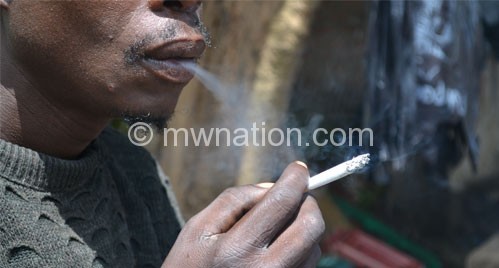Anti-smoking treaty gets stiffer, trouble brews for Malawi grower

There is more trouble brewing for Malawi’s principal forex earner, tobacco, as the World Health Organisation (WHO)’s anti-smoking treaty is getting stiffer to control consumption.
According to a press statement by the WHO Framework Convention on Tobacco Control (FCTC) secretariat on Saturday, the sixth session of the Conference of the Parties (CoP6) to the WHO FCTC in Moscow concluded several landmark decisions, including stiffer taxation on tobacco, a move which will reduce demand for Malawi’s leaf fondly called green gold.
According to the statement, taxation is a very effective tool for influencing the prices of tobacco noting that higher taxes usually lead to higher prices, which in turn lead to lower consumption.
Specifically, the regulations provide for tax rates to be monitored, increased and adjusted annually, taking into account inflation and income growth.
The CoP6 also agreed to strengthen international collaboration on tobacco control and attain a voluntary global target of 30 percent prevalence reduction by 2025.
However, chief executive officers for Tobacco Control Commission (TCC) and Tobacco Association of Malawi (Tama) Bruce Munthali and Graham Kunimba respectively could not be reached on their phones on Monday.
But reacting to the implementation of the anti-smoking treaty, Munthali earlier said anything that reduces demand for cigarettes has an effect on the demand for tobacco and consequently affecting Malawi because the country grows a lot of it.
Earlier, Kunimba and Minister of Agriculture, Irrigation and Water Development Allan Chiyembekeza backed a move to sign the FCTC, arguing it will give Malawi an opportunity to have a stronger position and effectively contribute to statutes and advance the country’s interests as a tobacco producer.
Tobacco, which employs 12 percent of Malawi’s labour force, contributes 15 percent of Malawi’s gross domestic product (GDP) and brings in over 60 percent of forex earnings as the country’s strategic crop.
According to TCC, the 2014 marketing season’s total earnings stood at about $361.56 million compared to last season’s $361.84 million, approximately an equivalent of two months of import cover.
According to TCC, this means tobacco remains the country’s main source of economic livelihood at micro level as well as an engine of growth at macro level.
However, apart from taxation, the CoP6 requested the FCTC secretariat to continue providing technical support, and to engage with international organisations on the matters of tobacco companies’ influence.
The Parties also agreed on proposals for regulation of e-cigarettes—smokeless tobacco and water pipe products—and Articles 17 and 18 which address sustainable alternative livelihoods for tobacco growers.






Anti smoking treaties are crooks. Same guys are making e-cigarettes. Its a monopoly of business. One gave negative research on milk now is producing organic wheat milk. Activism is the same game. Big companies don’t care about health and welfare of people. Their concern is profit.
Take time before you jump into western awareness campaigns